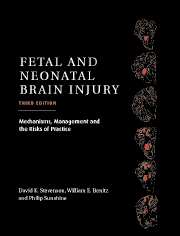Book contents
- Frontmatter
- Contents
- List of contributors
- Foreword
- Preface
- Part I Epidemiology, Pathophysiology, and Pathogenesis of Fetal and Neonatal Brain Injury
- Part II Pregnancy, Labor, and Delivery Complications Causing Brain Injury
- Part III Diagnosis of the Infant with Asphyxia
- Part IV Specific Conditions Associated with Fetal and Neonatal Brain Injury
- 26 Hypoglycemia in the neonate
- 27 Hyperbilirubinemia and kernicterus
- 28 Polycythemia
- 29 Hydrops fetalis
- 30 Acidosis/alkalosis
- 31 Meconium staining and the meconium aspiration syndrome
- 32 Persistent pulmonary hypertension of the newborn
- 33 Pediatric cardiac surgery: relevance to fetal and neonatal brain injury
- Part V Management of the Depressed or Neurologically Dysfunctional Neonate
- Part VI Assessing the Outcome of the Asphyxiated Infant
- Index
- Plate section
31 - Meconium staining and the meconium aspiration syndrome
from Part IV - Specific Conditions Associated with Fetal and Neonatal Brain Injury
Published online by Cambridge University Press: 10 November 2010
- Frontmatter
- Contents
- List of contributors
- Foreword
- Preface
- Part I Epidemiology, Pathophysiology, and Pathogenesis of Fetal and Neonatal Brain Injury
- Part II Pregnancy, Labor, and Delivery Complications Causing Brain Injury
- Part III Diagnosis of the Infant with Asphyxia
- Part IV Specific Conditions Associated with Fetal and Neonatal Brain Injury
- 26 Hypoglycemia in the neonate
- 27 Hyperbilirubinemia and kernicterus
- 28 Polycythemia
- 29 Hydrops fetalis
- 30 Acidosis/alkalosis
- 31 Meconium staining and the meconium aspiration syndrome
- 32 Persistent pulmonary hypertension of the newborn
- 33 Pediatric cardiac surgery: relevance to fetal and neonatal brain injury
- Part V Management of the Depressed or Neurologically Dysfunctional Neonate
- Part VI Assessing the Outcome of the Asphyxiated Infant
- Index
- Plate section
Summary
Introduction
Meconium-stained amniotic fluid (MSAF) occurs in approximately 10–15% of all pregnancies. The presence of MSAF has been recognized as being associated with adverse fetal and neonatal outcomes for centuries. In fact, Aristotle gave the substance the name meconium-arion, meaning “opium-like,” as he believed it induced fetal sleep. The philosopher likely recognized fetal deaths and neonatal depression as being associated with meconium, hence the appellation. Obstetricians and pediatricians recognize the relationship of MSAF with stillborn infants, abnormal fetal heart rate tracings, neonatal encephalopathy, respiratory distress, and an abnormal neurologic outcome in some survivors. Nevertheless, the vast majority of infants born through MSAF do not have apparent antenatal, intrapartum, or postnatal problems. Thus, we have somewhat limited ability to be able to predict and prognosticate from the presence of MSAF. Health-care providers should be appropriately concerned about both MSAF and meconium-stained neonates who subsequently develop respiratory distress, the meconium aspiration syndrome (MAS). However, despite the frequent occurrence of MSAF and MAS, there remains a distinct paucity of literature describing the neurological development of either children born through MSAF or those with MAS. In this chapter, I will present what is currently known about the substance and its association with adverse outcomes.
Historical aspects
More than 75 years ago, Schulze reviewed several controversies concerning MSAF, including whether its presence reflected fetal asphyxia vs a physiologic process, as well as whether MSAF represented a grave prognostic omen.
- Type
- Chapter
- Information
- Fetal and Neonatal Brain InjuryMechanisms, Management and the Risks of Practice, pp. 612 - 635Publisher: Cambridge University PressPrint publication year: 2003
- 4
- Cited by



